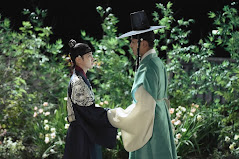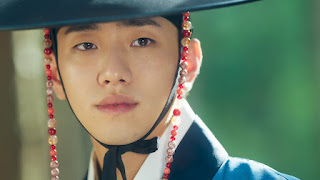A historical tale of a princess who is forced to take on her dead brother’s identity and falls in love with her tutor sounds just like my cup of tea, yet it reads like any other been there, done that kind of trope already seen in a hundred other romantic historical dramas.
Though on paper the storyline seems hackneyed, there was a
freshness here, a magic that I have not experienced in any other movie or
series. Part historical romance, part drama, part adventure and part political
intrigue – The King’s Affection has it all. While this in itself is nothing
special (as any Bollywood fan will tell you), what was so unique to me was how
seamlessly these different facets were woven into the overall plot.
This is very difficult to explain in words as it was an
almost intangible experience to me as a viewer, but I will try. In most other
multi-genre productions, at any given point in time, the romance, for example,
will overtake the action (perhaps to draw us closer to the characters) and then
later romance will take a backseat as more action is necessary to drive the
plot forward. However, with The King’s Affection, never once did I feel like
the different genres were competing against each other for space or attention.
I believe one of the reasons for this is the brilliant pacing.
The opening scene plunges into the thick of things without wasting time on exposition.
This is a wonderful creative choice when done right, however it so often goes
horribly wrong, leaving you not caring enough about the characters to want to
know what happens next. The King’s Affection gets this perfectly right. I was
immediately invested in the tale of the doomed baby princess – all I wanted was
to see her safe and wait for the day her evil grandfather would be made to pay
for his sins.
But as the story gets into the middle act, things relax, though there is always the sense of dramatic tension as the stakes get higher and higher. Those who just want action, action, action all the time may find these episodes boring or slow, but I loved the opportunity this gave us to see the nuances of each character and each relationship that was being fleshed out onscreen.
The lead characters’ relationships with their fathers were
very well depicted, as were the relationships Hwi shared with her maternal
grandfather and her wife Queen Ha-Kyung. So was the relationship between
Inspector Jung and Commander Yoon, and the flashback scene of them lying in the
grass staring at the sky is touchingly beautiful and understated.
At the risk of sounding morbid, I must say that the death
scenes were some of the most powerful moments in the story. The deaths of Commander
Yoon and Inspector Jung brought tears to my eyes, and I was completely
unprepared for the sudden and brutal killing of Prince Gyeom (I really expected
that he would take the throne and that Hyun would die).
The pace picks up once more in the final act, towards a
perfectly executed climax. It is all too easy for a show like this to have a
predictable ending (and it would still have been a great watch). I was waiting
for a showdown between Prince Hwi and Lord Sangheon with some kind of epic
battle, but instead we got a surprisingly sophisticated and well-executed final
episode that had me guessing at every turn. Each time I thought it would swing
one way and then it went the other, I was really afraid at one point that our
favourite couple would not get their HEA!
At the beginning of my previous post, I mentioned that I
loved almost everything about this series. I had a couple of (very)
minor gripes though, with regards to the editing in two specific scenes.
Firstly, the death of the Crown Princess Han was very choppy – it was as if an
entire scene had been forgotten at the cutting table! I also remember there
being another poorly edited scene towards the middle of the series, but I
forget which. Other than these two instances, the screenplay was consistently
flawless.
Another unique aspect of the storytelling was how the
closing scene of an episode was repeated as the opening scene of the next
episode, but shot at a slightly different angle, so that we would see the same
scenario from multiple perspectives (initially, I thought they were just
repeating the identical scene and even skipped the first few seconds!) Very
subtly done, but it gave a whole new interpretation to the plot!
I am not an expert on camerawork so won’t get into
technicalities here, but the visuals were breathtaking. Each frame was like a
painting, a surreal glimpse into a different world. My favourite was the entire
forest sequence, where Ji-woon catches sight of Dami for the first time. Their
secret garden, which basically symbolizes the purity and innocence of their
love despite the madness of the world around them, was also beautifully shot.
I am also not well-versed in Korean period fashion so while I cannot comment on their historical accuracy, the costumes were simply stunning. I read somewhere that one of the reasons Park Eun-bin took on the role was because she got the opportunity to wear dragon robes. I can totally understand:
The costumes worn by Queen Ha-Kyung and Shin So-Eun were so colourful and pretty, especially the floral hair accessories. I like how they were dressed so feminine and dainty, in direct contrast to Dami, and how this was tied into the overall plot. She yearns for beautiful trinkets herself, and what she wants most from Ji-woon is a hair clip.
The show also boasted some of the most gorgeous head gear seen in a historical drama, and I think only Korean actors can pull them off:
Finally, it would be an injustice if I did not speak about the music. The background score as well as the original soundtrack (OST) are out of this world. I have not heard any Korean music before, but now I find myself listening to these songs on loop, they are so gorgeous! (In fact, this is how I got to know the term “OST”) Love them all, but my favourites are “Shadow of You”, “One and Only”, “If I”, “Hide and Seek” and of course, “No Goodbye in Love”.
I apologize for the super lengthy posts – in fact this is the first time I have written two posts on a single topic – but it was the only way could truly express what a unique experience watching this show was to me! I really hope you enjoyed reading these as much as I enjoyed writing them!

















